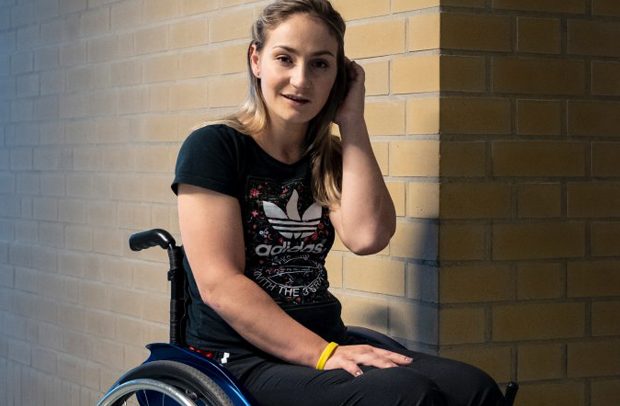Kristina Vogel
“The big deal was learning that crying is OK. I never was a person who cried a lot. Especially, not winning the Olympic gold medals in 2012 and 2016. I never cried. Never cried.
“A lot of my friends and family had not seen me cry. But it’s OK to cry, and to feel how bad it is.
“It is bad. I can’t walk any more.
“Sometimes I call my friend and we cry for a few minutes. And then it’s fine, and I dry my tears and I go on.”
Kristina Vogel was a remarkable woman in her first life, as a superstar track cyclist, and she is turning out to be more remarkable still in her second.
On 26 June this year, during a regulation training session at the Cottbus velodrome in her native Germany, Vogel collided with a Dutch cyclist who was practising his standing starts. She was travelling at close to 40mph.
The impact severed her spinal cord at the seventh thoracic vertebrae. A straightforward, impersonal, medical phrase for the most catastrophic of outcomes.
“It was a normal day. We had planned a few things in the afternoon for [fellow cyclist] Max Levy’s birthday. I was training with my team-mate Pauline Grabosch. She was in front, and then she passed… and then there’s nothing. Just black.
“I woke up on the track, lying. I said to myself: ‘Breathe, just breathe…’
“They took off my shoes, and I couldn’t feel it when they touched my feet. I saw a team-mate take the shoes away. And in that moment I thought: that’s it, I don’t feel my feet, I don’t feel my legs.
“There was no panic. I just said to Max Levy: ‘Hold my hand.’ I think I was pressing too hard. ‘Max, don’t leave me alone. Don’t let go of my hand.’
“I was more scared of being alone in that second than I was of not walking any more. I just wanted somebody to stay by my side. Stupid, huh?”
Vogel was always about speed. Eleven times a world champion, twice Olympic gold medallist, the German loved swooping off the steep banking hammering along in the slipstream of a rival, popping out to overpower them.
When we talk she is tired, her morning spent at a news conference, her afternoon now with me, concentrating hard in her second language. She sits in a wheelchair, and she remembers.
“To be honest, I thought I might die. After the first operation, it was hard to select the right medication for me. The first two days after waking up from the coma, it was the hardest fight in my life I have ever had. Every breath I had so much pain.
“I have no idea how I got through it. There was one night when the cleaning woman came round. Normally when they clean the rooms in the hospital they know that there are people lying there in pain. So she asked me if everything is good.
“I said, ‘No, please call the doctor, please call the doctor.’ And she cried next to my bed. Just the cleaning assistant from the hospital; that’s how hard it was in the first week.”


